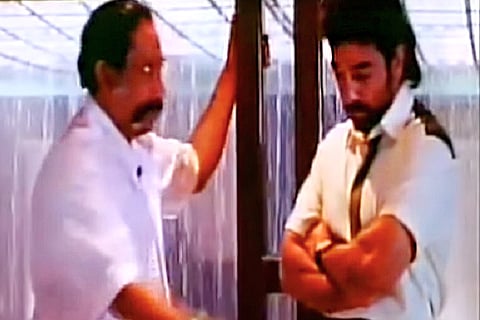

25 years after it first released, Kamal Haasan’s Thevar Magan remains a landmark film in the Kollywood canon. While a section of fans appreciates the film as a potent call to reform caste-ridden lives with education, many detractors see the film as a celebration of caste pride and a glorification of the Thevar community.
Love the film or hate it, it’s hard to ignore Thevar Magan. In a video released on Filmcompanion.in for the 25th anniversary of the film, Baradwaj Rangan cuts away from the politics of the film to carry out a masterful analysis of what makes Thevar Magan a classic work of filmmaking.
For those who came in late, Thevar Magan tells the story of Sakthivelu (Kamal Haasan), the son of a village chieftan Periya Thevar (Sivaji Ganesan). Sathyavelu returns to his native village to get his father’s permission to marry his girlfriend (Gautami), but gets embroiled into the disputes of the village – primarily involving Periya Thevar’s step brother and his nephew Maaya Thevar (Nasser). Along the way, Sakthivelu is forced by circumstances to give up his relationship with his outsider girlfriend and fully immerse himself in the village politics, which takes a very violent turn.
One of the main points that Rangan picks up about the screenplay, which Kamal Haasan reportedly wrote in just seven days, is the way it uses small gestures to say a lot between the lines, without explaining everything in tiresome detail.
So, Rangan talks of the opening sequence of the film, where Gautami stumbles as she is about to enter the house because some fireworks frighten her, and Kamal instinctively grabs her hand to steady her. Sivaji notices this gesture, and shows a look of firm disapproval. With such a small scene, says Rangan, the film establishes the festive atmosphere of the village at the return of its favoured scion, and the discordant note that Kamal’s intimacy with his westernised girlfriend strikes through it all.
Rangan points out various other such symbolic moments in the film that show in just seconds what would take reams of dialogue to explain. For instance, what really draws Kamal’s character into the politics of the village is a flood caused by Nasser that kills many village residents. Rangan talks of how this scene focuses on Kamal’s bare feet slipping into the sludge left behind by the flood, symbolizing that Kamal is finally fully stepping into this muddy world.
Similarly, the film shows Gautami’s character repeatedly boarding and getting off trains to clearly mark her outsider status in the film. Then there’s also the fact that Kamal’s commitment to Revathy, whom he marries, is shown by the fact that only she gets a love song and not Gautami’s character.
Rangan also talks about various elements in the cinematography and soundtrack of the film that play off and highlight other instances of symbolism throughout the film.
The pivotal core of the film, that Rangan picks up on, is the father-son relationship between Kamal and Sivaji, which Kamal once characterised as a “love story between Sivaji and me. I wanted to become him and he allowed me to become him and for that I am grateful.” Rangan shows how Kamal and Sivaji repeatedly play off each other to establish this deeply intimate relationship across generations.
Rangan also talks of how the song Portri Paadadi Penne and the climactic fight of the film, reflect the way in which the individual characters lives’ are tied to a larger destiny of the village, one which Kamal tries to escape but fails. It is in this context that Kamal’s lines after the climactic fight become signficant, where he cries to the people around to “go farm your fields, educate your children,” even as he walks away from the violence that he has become inextricably mixed with.
Watch the whole of Baradwaj Rangan’s analysis of Thevar Magan here: